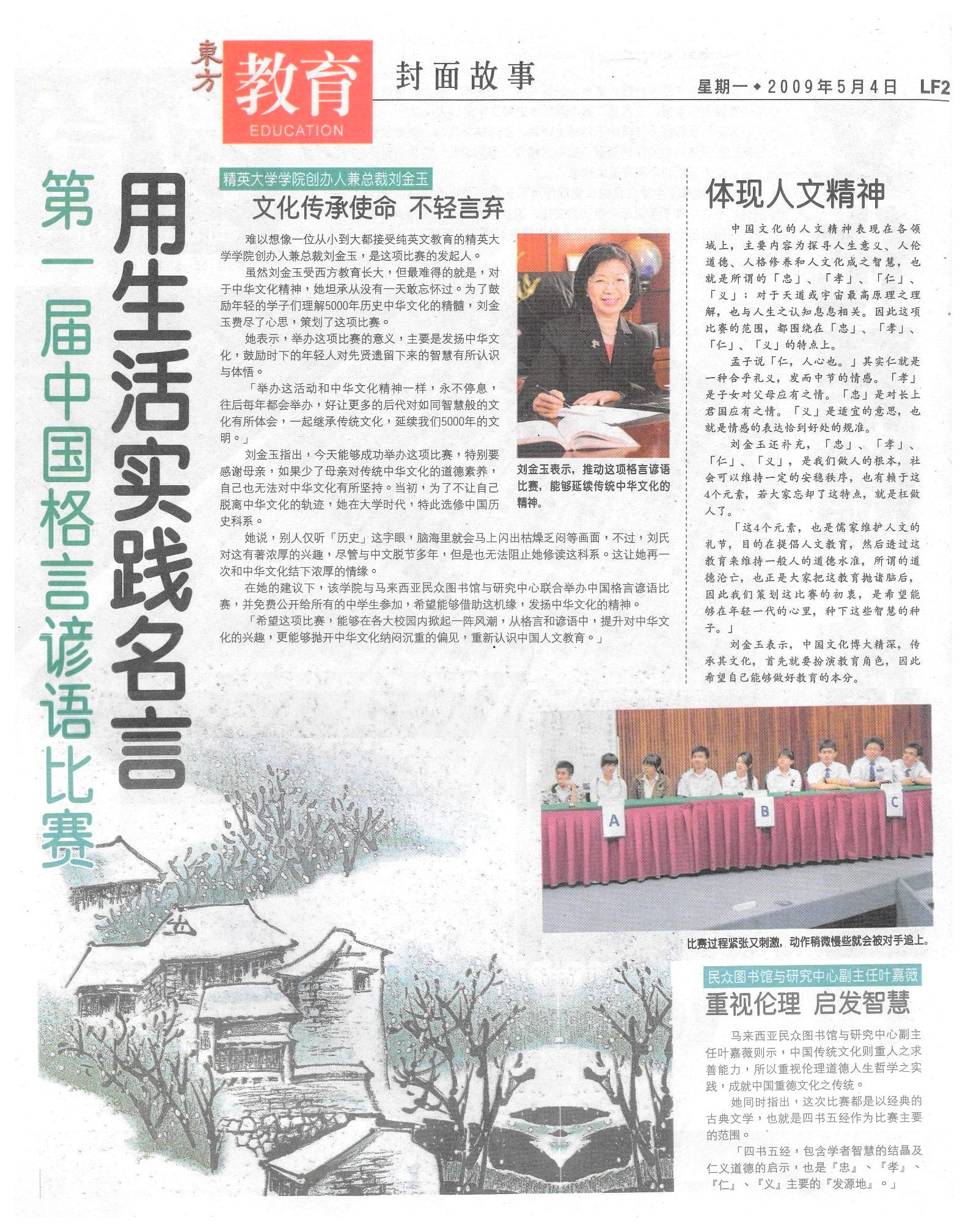Malaysian 1st Chinese Wisdom Contest
拿督斯里黄家泉先生 DATO’ SERI ONG KA CHUAN
First of all, I would like to thank the organizer for paying attention to the importance of Chinese proverbs and proverbs, and for hosting such a life-educational contest.
Just like the proverbs and proverbs of other nations, Chinese proverbs and proverbs are also a reflection of the wisdom of a nation. From its history and cultural evolution and accumulation, our nation has handed down a number of tempered adjectives and sentences. The wonderful thing is that they can describe people’s temperament, state and the state of things very vividly. If we explain the content of these maxims and proverbs, we can learn from them not only the experience of life.
From proverbs as descriptive sentences and the descriptions borrowed from them, we can also learn about science, literature and other aspects of knowledge. For example, the sentence “reach out your hand without hitting the smiling face” is to talk about the scene of how to deal with interpersonal relationships; “Immigration, emigration” refers to the influence of environment and nutrition on the change of people’s temperament, and “Failure is The “Mother of Success” also expresses the importance of experiments and accumulated experience, the scientific and mathematical exclusion rate theory, in a simple and concise way. There are also such things as “the wall of grass”, “the bank of a thousand miles, collapsed in the ant’s nest”, “weasel pays a New Year greeting to the chicken”, etc., which are about life experience, but the vivid description of the picture allows people to further understand the ecology of animals . “Stay in the green hills, not afraid of no firewood” is the life experience and the concept of environmental protection. As for “the jade is not cut, it is not a tool”, it also involves the understanding of minerals and craftsmanship.
Moreover, the concise and concise discourses of maxims and proverbs mostly reflect people’s practical experience in life, which makes it more convenient for them to be spread among the people, and they have the nature of social education. General proverbs and proverbs are passed down orally, and their origins are unknown, but many proverbs describe things that happened in the past to describe the current situation, and they can be said lively and vividly, such as “a talented person meets a soldier”, etc. , So some proverbs are the living fossils of history and cultural traditions.
We live in today’s world. Learning aphorisms and proverbs is not only an expression that facilitates the communication process, but furthermore, it is a way for us to visualize and remember the wisdom of the ancients, and it will not be boring. If this kind of competition can be held year after year and arouse people’s interest in learning aphorisms and proverbs, I am convinced that its effect will not only help improve the level of Chinese, but also help promote everyone to learn the wisdom of the ancients, and it will be more beneficial to cultivate individuals Life accomplishment.
Message from the Chairman of the Contest
拿汀刘金玉 Datin Low, Kam Yoke
The traditional culture of an ethnic group must be inherited by the three units of family, education, and society.
But, who else is insisting on playing this role now?
The pace of development of the times has gone too fast, leading to the fading of traditional cultural meanings. Whether it is traditional buildings, the golden words of the ancients, traditional virtues, customs and habits, they have also disappeared silently… The elders sighed: “Today is different from the past.” Powerless to stop the torrent of the times, I had to let the impact go. The younger generation seems to know little or nothing about the original ethnic culture.
In an interview with Oriental Daily, Liu Jinyu, president and founder of HELP University College (精英大学学院), said that the current duck-filling education system cannot inspire students to think. It is filled with knowledge without educating the principles of life, which has caused traditional educational values to be gradually lost. Dilute.
“In fact, the work of inheriting culture is also part of education, and traditional moral education is also very important for the future development of students.”
Liu Jinyu, who is educated in English, has a keen interest in Chinese culture since she was a child, and her mother constantly instilled in her ethical concepts such as “loyalty, filial piety, benevolence, justice, and morality.” Under the influence of her mother, she is more unique in Chinese mottos and proverbs. bell.
Under Liu’s suggestion, the college and the Malaysian Public Library and R&D Center jointly organized the “National Chinese Proverbs and Proverbs Contest for Secondary School Students”, and it was open to middle school students across the country to participate for free. Understand and use ethos.
“We hope that through this competition, students will be interested in sayings and proverbs, and we believe that after they understand the meaning of Qizhong, they will remember them and integrate them into their daily lives.”
She went on to say that among the scholars, farmers, commerce and industry, “shi” is the head. The so-called “shi” refers to scholars, meaning intellectuals. It can be seen that reading and literacy are very important.
She pointed out that the English name of the elite college is “HELP” and the Chinese interpretation of the word “HELP” means help. Therefore, she and her husband, Dr. Chen Dehong, who is also the founder of the elite college, hope that the college can help students through education Make brilliant achievements on the road of life.
“Elite Academy is people-oriented. Even when we talk to students, we don’t forget to instill the principles of life or moral values in them.”
The wisdom of the ancestors is a cultural treasure, and many things are worth learning from you and me, but a lot of them have been lost or disappeared. Therefore, Liu hopes that the younger generation can discover these treasures, study hard, and comprehend them with heart.
“Chinese culture is extensive and profound, and there are too many things to be inherited, but we will play the role of social education and do a good job of inheritance step by step.”
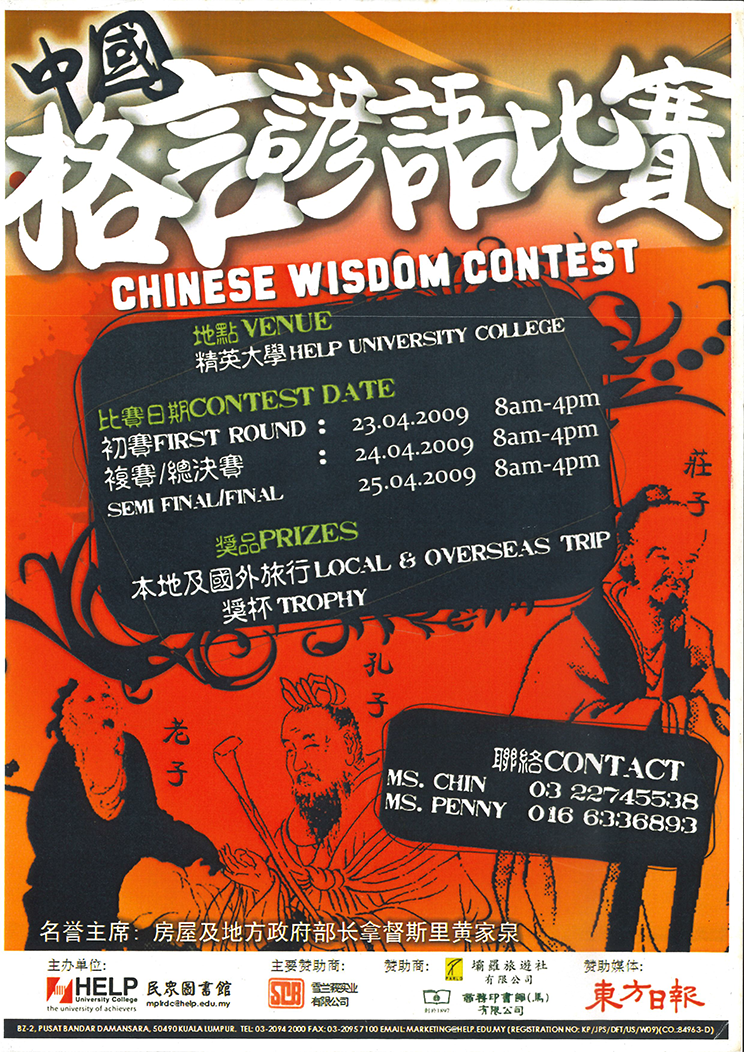
第一届全国中国格言谚语比赛
Chinese Wisdom Contest
Malaysian Public Library under the cooperation HELP University Collage, having The 1st Malaysia Chinese Wisdom Contest,
the competition from 23 April to 25 April 2009, accommodation were well arranged for all the participants from different state of Malaysia.
Committee members shown as table below:
Purpose
The purpose of the contest are:
1.promote and inheriting Chinese wisdom culture
2.improving and exploring young generation about the interest of he Chinese wisdom culture learning.
Contest Regulations
Contest Type·: Elimination system-written examination and common sense quiz
Qualifications: All Malaysian middle school students (no age limit) need to attach a copy of the front and back of the ID card for the purpose of checking the name of the contestant. After registration, it is not allowed to change at will.
Participation rules: Each school can send two teams of representatives to participate. If there are not enough participating teams, the organizer will send an invitation letter to send an additional team, and only a limited number of teams will be admitted.
Participation Reference: Refer to “The Essence of the Latest Famous Sentences”, “The Golden Classic of Chinese Proverbs and Allegorical Wisdom” and “A Complete Collection of Chinese Classical Quotes” for preparatory work. Related books can be purchased by email to the Commercial Press (M) Co., Ltd. (klcomb@gmail.com).
Registration/inquiry method: download the help name form via Facebook, fax or email
Deadline for registration is set to one month.
The activity fee is free.
Meals and accommodation: The organizer will provide free accommodation and meals for 2 nights, except for dinner.
Prizes: scholarships, cash prizes and books. Each participating representative, including alternates, will receive a certificate.
Contest format
Divided into two parts: written test and head-to-head competition
First lap: divided into: A. Written test and B. Group match-up and elimination competition. The four teams with the highest total points in each group will advance to the top 24.
Second lap: Aphorisms, proverbs and common sense quiz. In this circle, the eight teams with the highest scores will advance to the semifinals.
Third lap: Top 8 semifinals, semifinals and finals. The match will be a knockout match.
Other details are as follows:
1. Each school can send 1 team of representatives, and each team is composed of three students.
2. All three elected representatives have to take a written test. Written test scores are calculated based on the total scores of the three representatives.
3. The question and answer time is 10 seconds, and all three positive candidates must participate.
4. The standard of question and answer is based on the designated reference book.
Contest rules
- Participants are not allowed to bring any relevant information about the content of the competition.
- All school representatives must wear school uniforms.
- All contestants must report 15 minutes before the start of the game, and they will not be able to report in five minutes before the start of the game.
- All contestants must present their ID cards to facilitate the organizer to verify the qualifications of the contestants.
Participants
19 different school from Malaysia were invited and traveled to Kuala Lumpur to participate on this 3 days contest, they are:-
| 1. | Chun Hua high School |
| 2. | SMK Hua Lian |
| 3. | Phor Tay Private High School |
| 4. | Han Chiang High School |
| 5. | Foon Yew High School |
| 6. | SMK Tanah Putih, Kuantan, Pahang |
| 7. | Hin Hua High School |
| 8. | Sung Siew Secondary School |
| 9. | Chong Hwa High School |
| 10. | SMK Chung Ling, Pulau Pinang |
| 11. | Penang Chinese Girls’ Private High School |
| 12. | Perak Yuk Choy High School PTE |
| 13. | SMK San Min (SUWA) |
| 14. | Kwang Hua Private High School |
| 15. | Chung Hua Independent High School |
| 16. | Sekolah Tinggi Nan Hwa (SUWA) |
| 17. | Confucian Private Secondary School |
| 18. | Tsun Jin High School |
| 19. | Kuen Cheng High School |
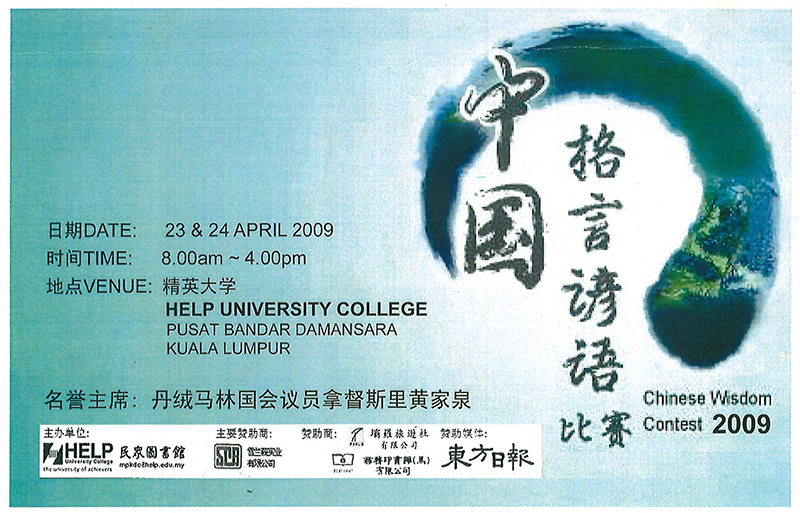
CONTEST COMMETTEES
| 大会主席 Contest Chairman | Datin Low Kam Yoke |
| 主席 Chairman | Mr. Lau Meng Lai |
| 秘书 Secretary | Penny Yap Ga Wai |
| 副秘书 Deputy Secretary | Lee Lai May |
| 总裁判 Chief Referee | Chao Quan Shen |
| 公关与宣传委员 Publicity | Juliet Chan, Asha Nair |
| 赛会秘书处委员 Contest Secretariat | William Low Wei Lin, Lv hai |
| 住宿安排委员 Accommodation | Tan Chooi Leng, Zoe Ooi Pei Jiu |
| 膳食安排委员 Meal and refreshments | Lee Teck Haw |
| 交通安排委员 Transportation | Phoon Chee Kin |
| 报道处 Registration | Loh Kian How |
| 设计 Design and Plan | Wong Xin Yi, Yong Feng Yi |
| 赛会主持人 Contest Host | Yap Cheng Leong, Lv Hai, Tie Siow Ning, Wong Snow, Wong Soo Lan, Xiao Fen, Poo Pei Che |
Newspapers Highlight
Visited to Oriental Daily News for Cooperation Discussion
Announced in Oriental Daily News on 2 March 2009
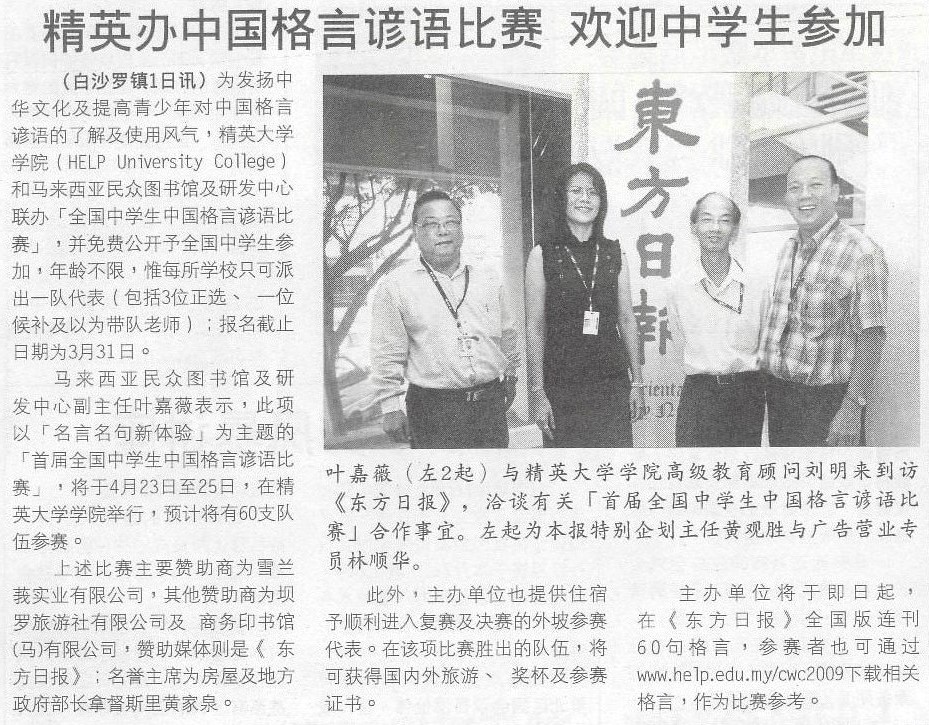
Contest Pre-Interview
Announced in Oriental Daily News on 8 March 2009
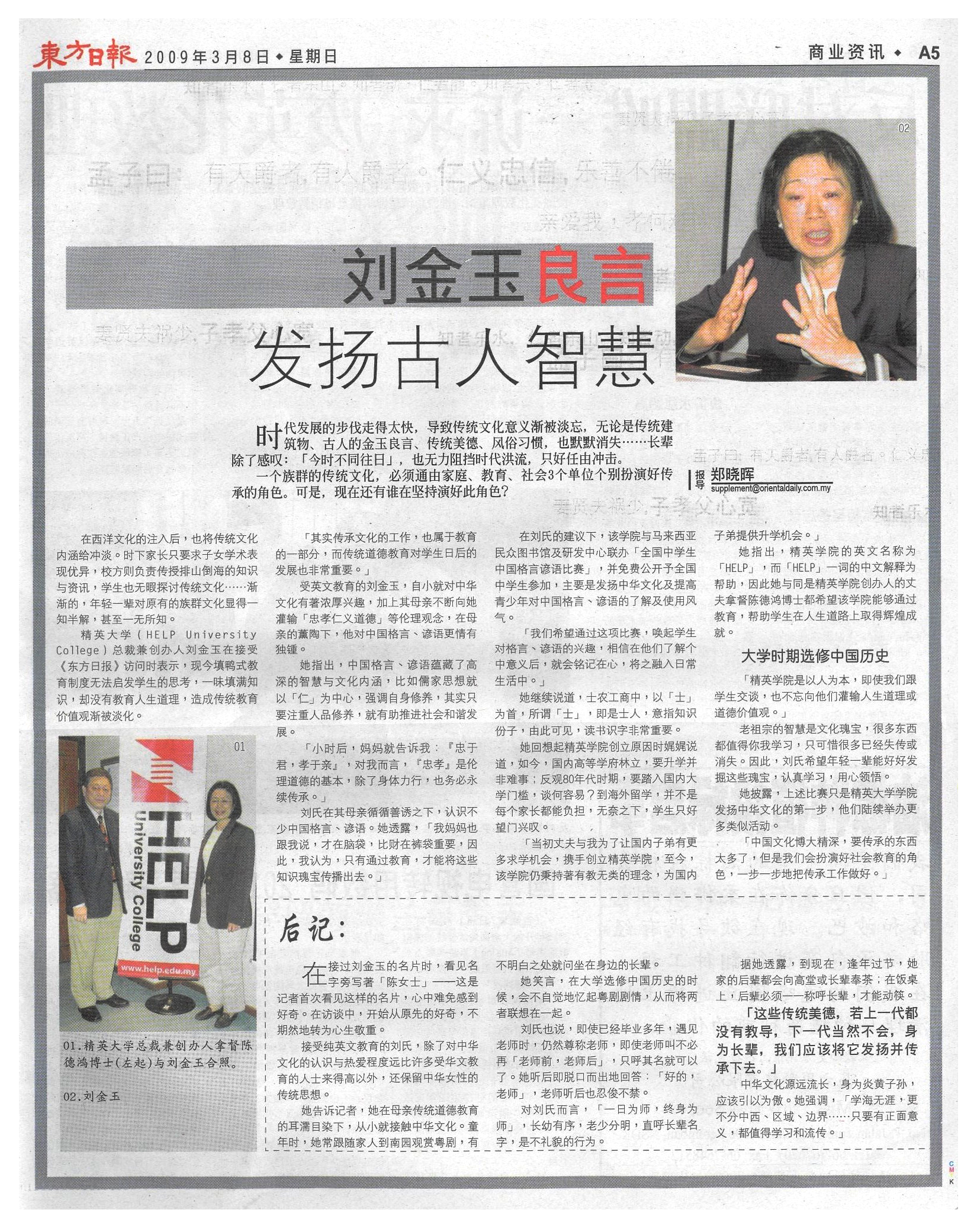
Opening Ceremony
Announced in Oriental Daily News on 4 April 2009
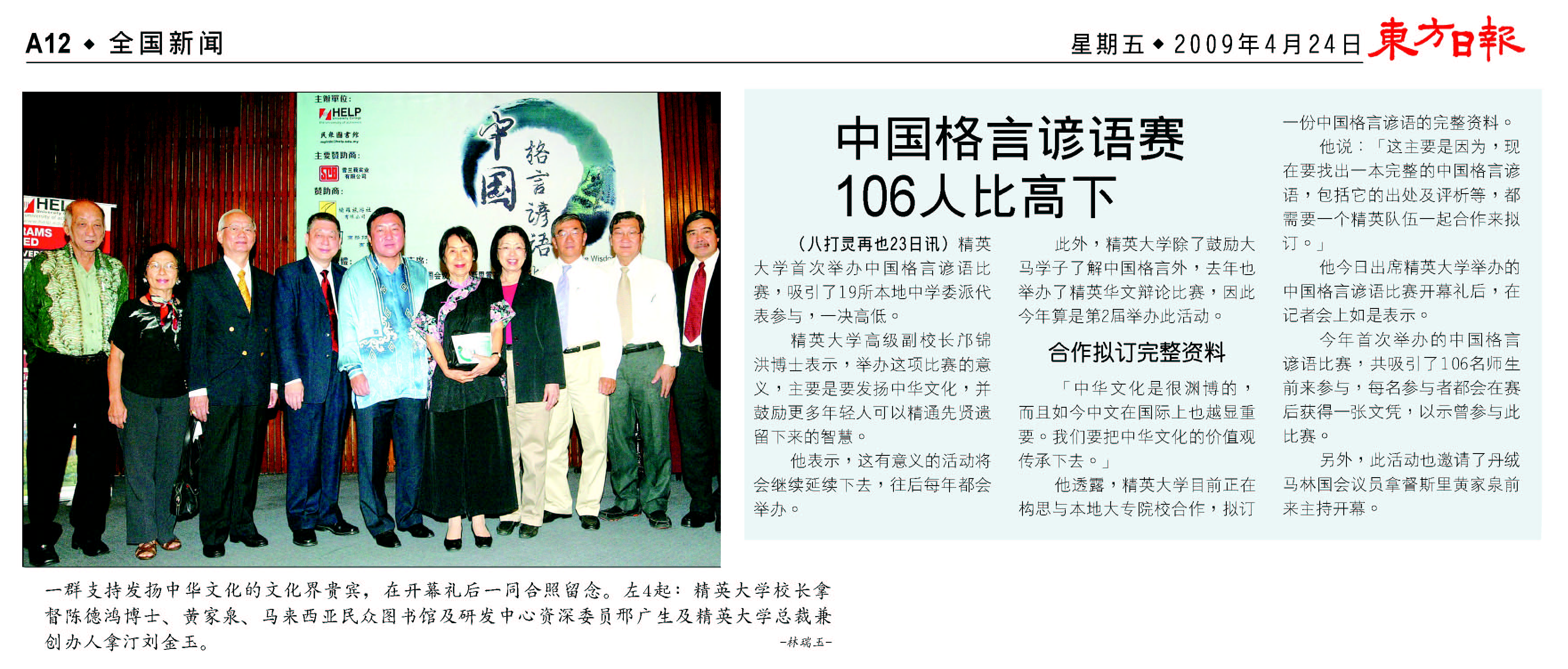
Closing Ceremony
Announced in Oriental Daily News on 27 April 2009
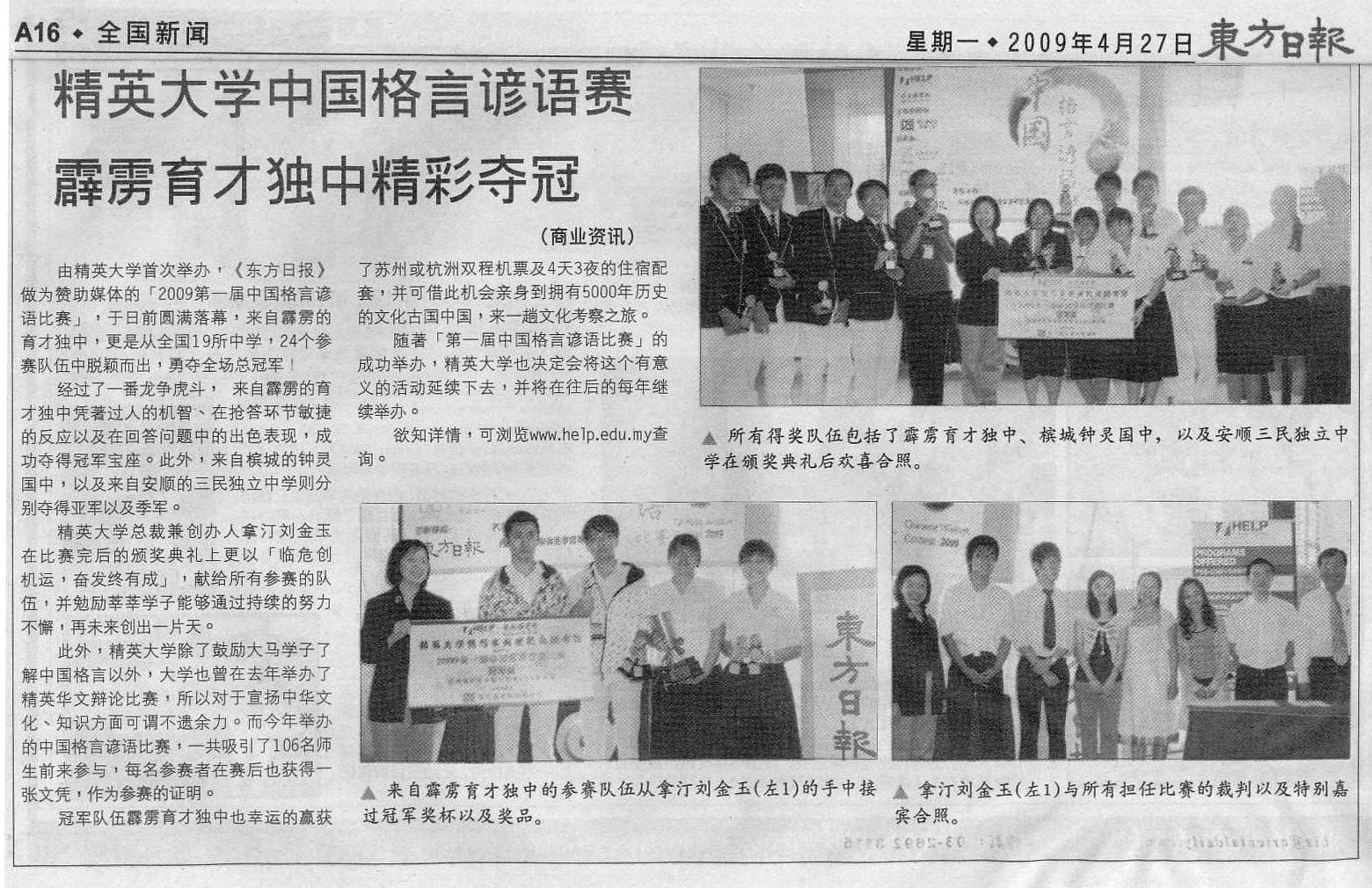
Contest Matters & Champion Team's Interview
Announced in Oriental Daily News on 4 May 2009
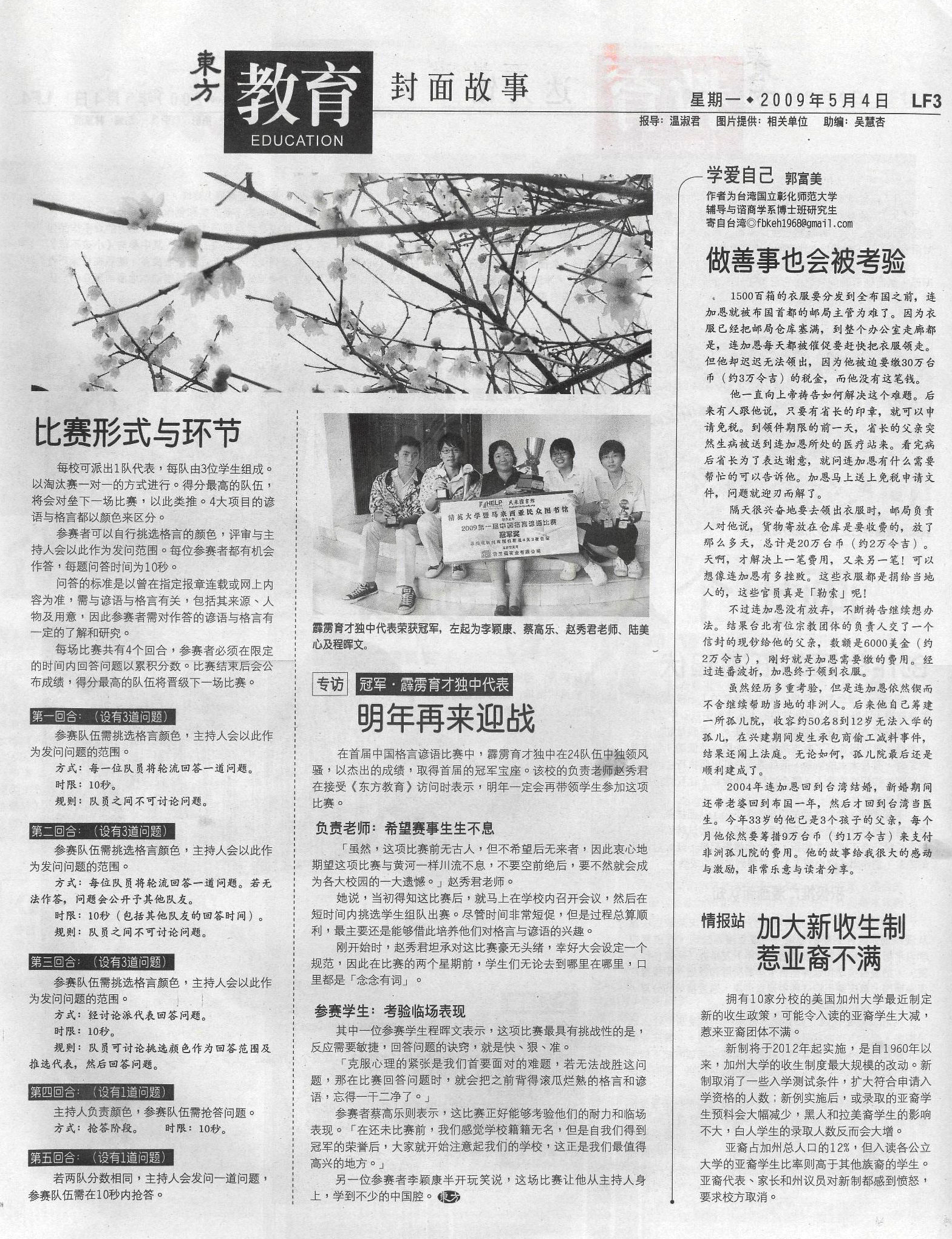
Contest Interview
Announced in Oriental Daily News on 4 May 2009
